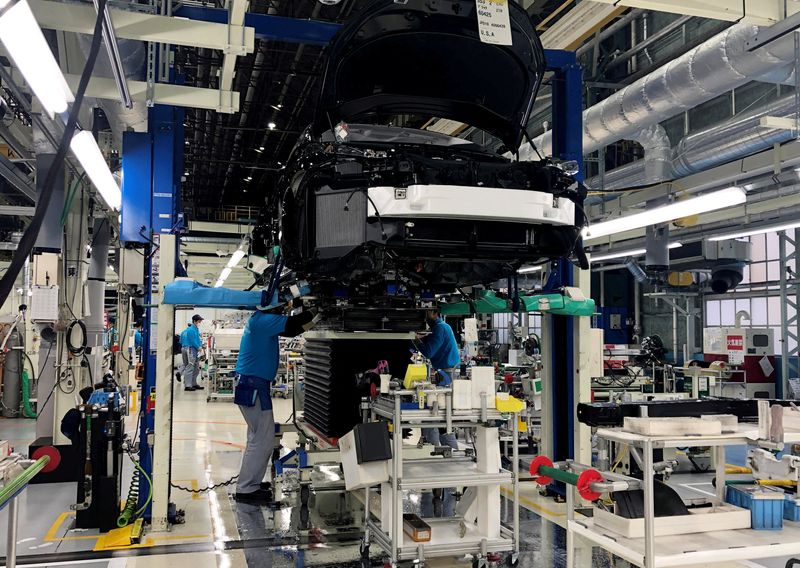By Tetsushi Kajimoto
TOKYO (Reuters) - Big Japanese companies look set to formally offer hefty pay hikes at annual wage talks with unions that wrap up on March 13, a move that will virtually cement the case for the central bank to phase out its unprecedented monetary easing in coming months.
Economists see the wage negotiations resulting in an average increase of around 3.9% in annual pay for union workers at major firms. That would be the biggest rise in 31 years and heighten expectations the BOJ would end negative interest rates by April.
The central bank has long contended that robust wage growth was a prerequisite for rolling back more than a decade of a radical monetary experiment that has aimed to lift Japan out of a protracted cycle of deflation and economic stagnation.
The annual "shunto" negotiations, long a defining feature of Japanese business, were closely watched in the high growth era, but became less important in the decades after the asset bubble burst in the early 1990s, as companies scrambled to shed the three excesses of debt, workers, plant and equipment.
Three decades on, wage negotiations are once again in the spotlight, as Prime Minister Fumio Kishida has made pay increases a top priority, as he looks to put an end to the years of meagre wage growth that have kept well behind the average for the OECD grouping of rich countries.
"This year, big firms will probably offer wage hikes of near 4%, which should prompt the BOJ to end negative rates in April," said Takeshi Minami, chief economist at Norinchukin Research Institute.
A fierce labour crunch in Japan has also driven home the message that companies need to increase pay, Minami said.
"Businesses can no longer stay afloat if they don't offer attractive pay to bring in young talent," he said.
While the wage talks directly impact workers at the biggest firms - a sliver of the workforce - they set the tone for the rest of the economy. Toyota Motor (NYSE:TM), for instance, has long been seen as a pacesetter.
Wages increases are increasingly important to attract workers as Japan is now grappling with higher prices, said Atsushi Takeda, chief economist at Itochu Economic Research Institute. That's also a big change from the past three decades when prices also budged little.
Japan's largest trade union confederation, Rengo, has demanded pay rises of 5.85% this year, topping 5% for the first time in 30 years.
Unions representing workers in industries ranging from automobiles, electronics, metals, heavy machinery as well as in the service sector have followed suit, demanding record pay hikes. Many of their demands are expected to be fully met.
"Strong pay offers are a done deal," a senior government official told Reuters requesting anonymity. "The BOJ could end negative rates in either March or April, if they wanted. It's just a question of timing."
INFLATION
Even though Japanese companies have been raising pay, the increases have largely failed to keep up with inflation.
Real wages, which are adjusted for inflation, have now fallen for 22 straight months. In January, the latest month available, real wages fell 0.6% year-on-year.
With inflation running at or above the BOJ's 2% target for nearly two years, nominal wages need to accelerate by more than 0.5%, meaning that the outcome of the wage talks would need to be a 4.5% increase to beat inflation, Norinchukin's Minami said.
Toyota workers are seeking pay rises of up to 28,440 yen ($190.85) a month and a record bonus payment worth 7.6 months of salary. The world's largest carmaker by volume is expected to formally respond to those requests on March 13.
Rival car companies Honda (NYSE:HMC) Motor and Mazda Motor (OTC:MZDAY) struck early deals last month, meeting union demands in full.
One important question is whether pay hikes would continue from next year and after - and whether they will spread to the smaller firms that employ seven out of 10 Japanese workers.
Smaller companies tend to have less leverage to pass on costs to clients, making it harder for them to raise pay.
Last year, the anti-monopoly watchdog laid out guidelines aimed at making it easier for smaller companies to pass on higher labour costs to bigger customers.
Tokyo has also extended collaboration among government, labour and management to regional levels so that the three parties can work together to improve wages across the country.
To overcome a labour crunch, Hisashi Yamada, a Hosei University professor and expert on labour issues, calls for improving productivity at small firms, many of whom engaging in labour-intensive operations.

"Small firms must boost productivity by investing in labour saving technology such as automation and robots," he said.
($1 = 149.0200 yen)